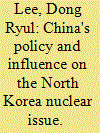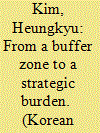| Srl | Item |
| 1 |
ID:
109834


|
|
|
| 2 |
ID:
099685


|
|
|
|
|
| Publication |
2010.
|
| Summary/Abstract |
China is the largest trading partner of the Democratic People's Republic of Korea (DPRK) and also provides considerable economic aid. Thus, China is said to have very strong economic leverage over North Korea. China's goal in its North Korea policy is to secure political and economic stability in the region peripheral to China by using such economic leverage. To achieve this goal, China is expected to approach the North Korea nuclear issue with a more comprehensive and longer-term viewpoint. China seeks to stably manage the North Korea nuclear issue by utilizing its economic leverage over North Korea in the short- to medium-term. China thinks that such management, through the Six-Party Talks, is the most appropriate solution to the North Korea nuclear issue as far as China is concerned. In the long term, China seeks to transplant its reform and open-door model into North Korea and to structurally soft-land North Korea as a China-friendly regime in the region that adjoins the northeastern border of China. If China determines that the North Korea nuclear issue will not lead to any serious insecurity directly affecting China, it is very likely that China will choose the method of managing the North Korea nuclear issue from a long-term perspective. To achieve such a long-term strategy, China must maintain its economic exchange and cooperation with North Korea, and not use it as a means to sanction North Korea.
|
|
|
|
|
|
|
|
|
|
|
|
|
|
|
|
| 3 |
ID:
099695


|
|
|
|
|
| Publication |
2010.
|
| Summary/Abstract |
The purpose of this article is to understand China's changing strategic views on North Korea during Hu Jintao's era and to consider the implications for South Korea's policies toward North Korea and China. Sino-North Korea cooperation can be theoretically explained by the alliance transition theory, a modified one from the political realist perspective. The implications of the alliance transition theory are that China would strengthen its alliance with North Korea, seek to weaken the South Korea-U.S. alliance, and induce South Korea to cooperate with China, while preventing North Korea from getting close to the United States. However, it is noteworthy that even in China, there exist various groups of strategic thinking in international relations on China's roles in North Korean issues. North Korea's incessant provocations have effects on mobilizing the Developing Country Diplomacy School as well as the Rising Great Power Diplomacy School against North Korea. Such incidences would soon reverse the rule of thumb of North Korea's strategic value rising alongside regional tensions, calling into question in China, again, the strategic value of North Korea. China still maintains its previous policy priorities at askance, but since North Korea's second nuclear test, the contents have been changing reflecting the changing security environments and its recalculation of national interests. As the more the North Korean nuclear crisis deepens, threatening peace and stability on the Korean peninsula, the more China would positively think over North Korea's contingency intensifying cooperation with the United States. In such transition, the stronger the rising great power thinkers, the less the diplomatic space for North Korea exists. North Korea would stop being a buffer zone but a strategic burden in their perspective, transforming China's relationship with North Korea from a special relationship to a normal state-to-state relationship.
|
|
|
|
|
|
|
|
|
|
|
|
|
|
|
|
| 4 |
ID:
103554


|
|
|